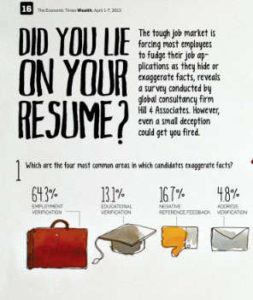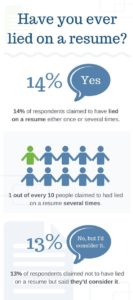
Why Lying on Your Resume Is a Bad Idea

Lying on your resume is not a good idea. This may affect a candidate in the long run in his career growth.
The job market today is competitive. Those who are in search of job undoubtedly know how difficult it can be to compete for the top positions. This competitive environment has led a few job seekers to embellish or exaggerate their experience to improve their chances of obtaining jobs. What are the consequences for the employee who has embellished on his resume if he gets caught?
Lying on your resume is not more than a risk. It can have a life-altering impact when the candidates get caught by the recruiters. Read the blog further and know what happens when you lie on your resume, including a few hidden dangers and risks you might not be aware of.

What happens when you Lying on your resume?
- Embellished job titles often sound bogus
One of the popular trends among candidates these days is to embellish their job titles. The basic idea here is that job seekers often worry about their current job titles as they are too mundane or unimpressive to grab the interest of a recruiter. Hence, they tweak those titles to make them sound more important. It seems bogus to experienced recruiters. So, adhere to the truth when it comes to your past job titles and avoids arousing suspicion.
- Your past references can poke holes in your present story
False job titles embellished lists of job duties, and inaccurate hiring dates may seem like things that could help your chances of getting hired. However, keep in mind that recruiters do call references. Even if you don’t mention an old employer, your previous boss is still likely to get a phone call.
Employers will verify the resume information of their most serious applicants. That may include a call to the HR department at the company you used to work. HR representatives won’t usually tell too much about former employees, but they will confirm or deny essential information like job titles, duties, and the date of hire.
This information can alone poke a hole in any story you are trying to fabricate on your resume.
- Verification checks can spot fake credentials like degrees or certifications
Calls to the previous boss and references aren’t the only verification checks that recruiters do. Many employers run a background check. Most of them will verify at least college degrees and professional certifications. If you lie about any detail on your resume, you will get caught for sure.
- Employers don’t like to hire liars
Put yourself in the shoe of an employer. Imagine that you are trying to fill an open position, and you want to recruit someone who will stick for a long time.
Would you more likely to take a chance on a candidate whose work history is thin but who seems passionate, smart, and friendly? Or would you more likely to hire someone who deliberately misrepresented his achievements and lied to your face? 100% of the time, recruiters will opt for the former, so don’t take the risk of being labelled a liar.
- You could end up under-qualified
Tailoring your CV to suit the job description is a good idea. But copying the skills and qualifications on the job description and pasting them into your CV if you don’t have those skills is not a good idea.
You don’t need a job for which you are not qualified. You will feel clueless, clumsy, and stressed out, and your bosses will notice it. Instead of trying to be something you are not, identify your best qualities and most marketable talents and find a job that you will be great at doing.
- Keeping all of your falsehoods straight is more arduous than it sounds
Telling the truth is easier than lying. Then, you don’t need to worry about repudiating yourself or casually saying something that brings your whole house of cards crashing down. Keeping all your lies is tough during the job screening process.
How will you manage to talk about a job that you never had in your interview? The worst part is, if you get the job, keeping your dirty little secret will only get harder. As lies pile up, it’s tougher to keep them straight. Save yourself the hassle and tell the truth.
Now, as you know what happens when you lie on your resume, you can decide it for yourself. Every situation is not the same, and telling the occasional white lie in the resume is something most of the candidates try.
However, in most cases, the risks of telling a big lie on your resume are not worth the potential reward. So, telling the truth on their resume is better.

Reach us for Hiring the best candidates with the leading Recruitment consultancy at Hand Phone: +91 7795547089 or Email us at team@bssrecruit.com.




